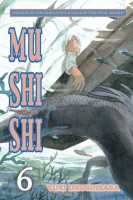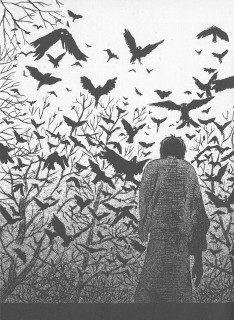 Creator: Yuki Urushibara
Creator: Yuki Urushibara
U.S. publisher: Del Rey
ISBN: 9780345501660
Released: November 2008
Original release: 2005
Awards: Japan Media Arts Award, Kodansha Manga Award
I discovered Yuki Urushibara’s award-winning manga series Mushishi more by chance than anything else, but it quickly became a favorite and I made a point to collect the manga as it was being released in English. I’m very glad that I did–replacing my copies would cost a fair amount since Mushishi is currently out-of-print and increasingly difficult to find. Fortunately, Kodansha Comics released the entire series digitally in 2014. Mushishi, Volume 6 was first released in print in English in 2008 by the now defunct Del Rey Manga. In Japan the volume was initially published in 2005, the same year that the series’ first anime adaptation began airing. (The Mushishi anime is also a personal favorite and I re-watch it frequently.) In addition to being popular enough to warrant multiple adaptations in a variety of different media over the course of its publication, Mushishi was also a recipient of a Japan Media Arts Award and a Kodansha Manga Award.
Mushi are creatures which are invisible to most and which few people truly understand. But even so, they are an integral part of the natural world, said to be very similar to the original form of life. Mushi’s influences on humans, though not necessarily intentional or malicious, can be both good or bad depending on the circumstances. Some people, like Ginko, have made a profession out of studying mushi. These mushishi gather and share invaluable knowledge about mushi and about the world. By closely observing mushi and their environment, mushishi are able to recognize signs of impending disaster, explain what would seem to be the unexplainable, and identify when and where balance to the natural order must be restored to avoid dire consequences. The work of mushishi is inherently dangerous as they are frequently dealing with the unknown, but their perseverance can also be extremely rewarding, allowing them to some extent to leverage and even control the abilities of mushi for their own purposes.
 Mushishi, Volume 6 collects five chapters of the series. Except for the presence of Ginko and mushi, none of them are directly related to one another, however three of the stories deal in some fashion with the powerful phenomenon known as kōki. Whereas mushi could be considered primordial, kōki is an even purer and more basic form of life from which the varied multitude of mushi originate. Kōki is portrayed as a river of light, the glowing liquid proving to have both harmful and healing effects depending on how it is used. Mushi are intensely attracted to these rivers and will seek them out. In “Heaven’s Thread” this becomes a problem for humans living near the light flow–mushi that prey on other mushi sometimes catch a person instead. Humans can also be infected by decaying kōki, as is seen in “The Hand That Pets the Night,” negatively impacting families for multiple generations while also benefiting them. The third story in Mushishi, Volume 6 delving into kōki is “Banquet in the Farthest Field” in which a sake brewer unknowingly attempts to replicate the taste of the liquor of life with unintended consequences.
Mushishi, Volume 6 collects five chapters of the series. Except for the presence of Ginko and mushi, none of them are directly related to one another, however three of the stories deal in some fashion with the powerful phenomenon known as kōki. Whereas mushi could be considered primordial, kōki is an even purer and more basic form of life from which the varied multitude of mushi originate. Kōki is portrayed as a river of light, the glowing liquid proving to have both harmful and healing effects depending on how it is used. Mushi are intensely attracted to these rivers and will seek them out. In “Heaven’s Thread” this becomes a problem for humans living near the light flow–mushi that prey on other mushi sometimes catch a person instead. Humans can also be infected by decaying kōki, as is seen in “The Hand That Pets the Night,” negatively impacting families for multiple generations while also benefiting them. The third story in Mushishi, Volume 6 delving into kōki is “Banquet in the Farthest Field” in which a sake brewer unknowingly attempts to replicate the taste of the liquor of life with unintended consequences.
The other two stories collected in Mushishi, Volume 6, while still unrelated, both explore the loss of a loved one. Mushi’s involvement in “The Chirping Shell” is actually fairly minimal as the chapter focuses on a man coming to terms with the tragic death of his wife and learning to forgive in the face of an even greater imminent tragedy of which the mushi are an omen. “Under the Snow” is likewise about a young man in denial who is grieving the loss of the life of his little sister. In this story snow-like mushi literally suck the heat from his body, but they also serve as a metaphor–because of his sister’s death Toki has become numb to the people and the world around him. Many of the stories in Mushishi can be read on multiple levels like this, which is one of the reasons that I love the manga so much and find it so enjoyable to read and reread. The series frequently feels like a collection of folktales and stories of the supernatural, but at its heart Mushishi is very often about an individual’s personal struggle when confronted by something in their life beyond their control or understanding.

[…] though! (I don’t want to jinx anything by saying too much, yet.) Anyway! Last week I reviewed Mushishi, Volume 6 by Yuki Urushibara as part of my monthly horror manga review project. I’ve read the series […]